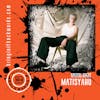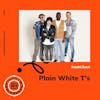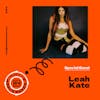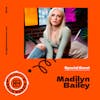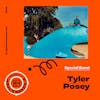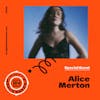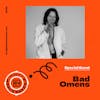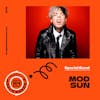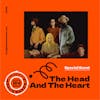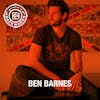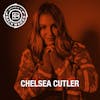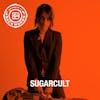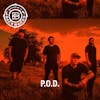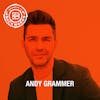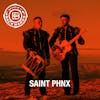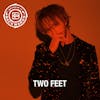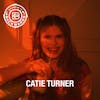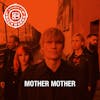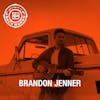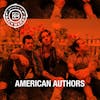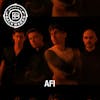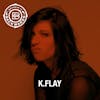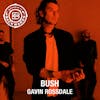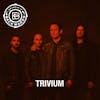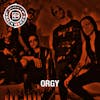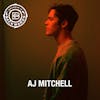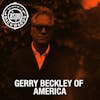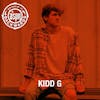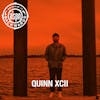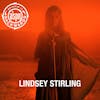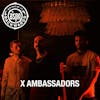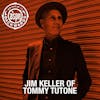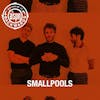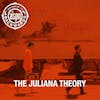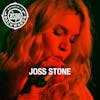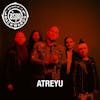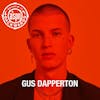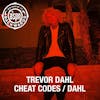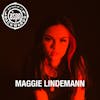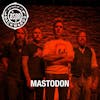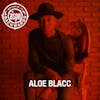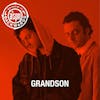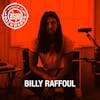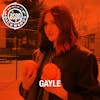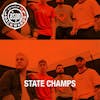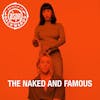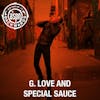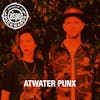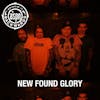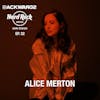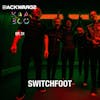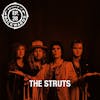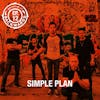Interview with St. Louis
We had the pleasure of interviewing St. Louis over Zoom video.
Presenting “Debut”, the brand new single from Liverpool-based musical marksman, St. Louis.
After years of developing his sound behind closed doors, St. Louis is finally showing his...
We had the pleasure of interviewing St. Louis over Zoom video.
Presenting “Debut”, the brand new single from Liverpool-based musical marksman, St. Louis.
After years of developing his sound behind closed doors, St. Louis is finally showing his craft to the world as an artist undeniably in his own lane. The jazz-R&B/pop-oriented musician is an amalgamation of the greats of past and present, with a sound existing somewhere in-between Jeff Buckley, The Weeknd, Freddy Mercury and… Thundercat?!?
Churning gospel choir-like harmonies decorate the moody, rhythmic backbone of the music as St. Louis’ vocals croon the tragedy of a man falling blindly in love for a woman he’s watching onstage. The song boasts a tale of obsession and lust, a narrative that marries well with the beautiful yet dark undertones of the music.
“Debut” is a hook-laden gem carrying both the grace of a sophisticated musical mind with the rhythmic modernity of a club banger. This slice of modern pop feels transatlantic while proudly wearing an oh-so British heart on its lyrical sleeve.
As well as being a performing artist in his own right, St. Louis has had multiple and ongoing success as a writer and producer. Notable cuts include ‘Morning’ by Karen Harding, producing and arranging Stealth’s “Black Heart”, feat. The Dap Kings, BTOB’s viral youtube smash “Outsider”, Goodboys’ latest single “Black and Blue”, amongst many other high-level collaborations with names such as David Guetta & Ava Maxx. He also produced and wrote the song ‘Green Light’ for social media starlet ENISA, who performed the song at the American Song Contest 2022, representing the state of New York.
The future is bright for this up and coming gem, and ’Debut’ marks a cornerstone in the creative powerhouse’s journey that you don’t want to miss.
We want to hear from you! Please email Tera@BringinitBackwards.com.
www.BringinitBackwards.com
#podcast #interview #bringinbackpod #StLouis #Debut #NewMusic #zoom
Listen & Subscribe to BiB
https://www.bringinitbackwards.com/follow/
Follow our podcast on Instagram and Twitter!
https://www.facebook.com/groups/bringinbackpod
We'd love to see you join our BiB Facebook Group.
Hello! It is Adam. Welcome back to bringing it backwards. A podcast where both legendary and rising artists tell their own personal stories of how they achieve stardom. On this episode, we had a chance to hang out with St. Louis over zoom video. Cameron, AKA St. Louis was born in Liverpool. Then moved down to London, spent a majority of his life in London until he went to uni where he moved back up to Liverpool and attended, sir, Paul McCartney's college up in Liverpool. He comes from a musical household, both his mom and dad are songwriters. His dad is a music teacher for kids and young adults with mental disabilities, which is really a cool thing. 3 (2m 7s): So Cameron tells us a little bit of what his dad does, which is super cool. He started off on drums, ended up going to piano, and then eventually guitar talks about writing songs starting around 14 years old, a band. He started while in high school, when he moved to go to college for music, he ended up having another band. While in college, he talked about two writing sessions he had with Paul McCartney, which is so cool. When he graduated, he spent 18 months, basically couch surfing, living on no food, no money trying to put together a demo to land a publishing deal. He ends up doing so, like I said, it took him about 18 months. 3 (2m 49s): He talks about that experience, writing songs with other people and eventually starting his now artists project St. Louis, and he tells us all about the music video and new song debut. You can watch the interview with St. Louis and myself on our Facebook page and YouTube channel at bringing it backwards. It would be amazing if you subscribe to our channel like us on Facebook and follow us on Instagram, Twitter, and Tik TOK at bringing back pod. And if you're listening to this on Spotify or apple music, Google podcasts, it'd be awesome. If you follow us there as well and hook us up with a five-star review, 4 (3m 26s): We'd appreciate your support. If you follow and subscribe to our podcasts, wherever you listen to podcasts, 3 (3m 32s): We're bringing it backwards with St. Louis. 5 (3m 35s): How are you, man? So whereabouts are you? You Kelly, or 3 (3m 38s): I actually just moved to Nashville a little over a year ago. My family, I are originally from San Diego, California. 5 (3m 45s): Okay, cool. 3 (3m 47s): Yeah. So I spent 99% of my life in California between San Francisco and San Diego a little bit in LA and now we moved to Nashville and we love it here. 5 (3m 58s): Oh, right up into Nashville. 3 (4m 1s): Yeah. It's amazing. 5 (4m 2s): I came for like a camp, like 3 (4m 4s): A, like a writing camp 5 (4m 6s): A few years ago, but it was really, really nice. 3 (4m 8s): It's beautiful here. We love it. But you're from where Liverpool is that what I read? 5 (4m 13s): I was, yeah. So I live in Liverpool. I was, I was born there. My parents moved down to London when I was about one. Okay. So I grew up in Tottenham and London. 3 (4m 28s): How far is the London from Liverpool? Dude? I'm so bad with the geo geographical. 5 (4m 33s): It's like, it's like, it used to be like a three and a half hour train, but now it's 20 to two hours. Two. I was in a bit. And the sped up the train 250 miles. It's like halfway up the country from London. 3 (4m 45s): Right on. So you were only in Liverpool originally for a year and then you moved down there and then, but now you move back. 5 (4m 53s): Yeah. I moved back for uni, so I studied music of there and I have like loads of family up there as well. So like, it just made sense. And it was, yeah, it's, it's always been my second home Liverpool. I've been going back and forth my entire life to visit family and holidays and things like that. So there's a lot to do around there for young kids. You know what I mean? It's like the seaside town kinda sure. 3 (5m 15s): And the home of the Beatles. Right. So obviously, 5 (5m 18s): Yeah, a lot of that that's for sure. 3 (5m 22s): Was that, like, how did you get to music where your, is your, do you cover a musical household at all? Or is it just the fact that you live in? You know? 5 (5m 29s): Yeah. So both of my parents were, or still are musicians songwriters, but they never quite like, they never signed any deals and they never sort of broke into the mainstream in any sort of way, or they just sort of did their own little thing. And so I've been surrounded by music my entire life. You know, I was just one of those kids who was kind of born into it and then sort of unofficial way. And I don't think there was anything, I wasn't going to do anything other than music, my entire life. You know what I mean? It's just, the path has kind of been laid out for me and I'm just hanging on for dear life. 3 (6m 5s): Yeah. No, for sure. Interesting. So your parents were songwriters or are songwriters and musicians, but that wasn't, that was not their full-time gig. 5 (6m 14s): No, like, I mean, they've tried to make it their full-time gig for sure. They never had, 3 (6m 19s): It's difficult. Obviously 5 (6m 21s): They didn't have any alternative career. Really? Both of my dad now sort of teaches music kind of to like dis disabled kids. So he like, he sings with them. Awesome. It helps like the communities and like the under, you know, kids with mental disabilities and things like that. And he's really good with them. Like he, he works with kids who can can't walk or have like severe levels of autism and things like that. And he, and he goes in there and sing songs with them and he gets reactions out of them. And it's really like, he's got this very, very exhausting, but incredibly rewarding job. 3 (6m 57s): So special. That's I've two kids, actually. It was autism, my oldest, oldest son, the younger son. And it's it's we have them in music lessons, both of them. And it's fascinating because my, especially my older one, he doesn't monitor, practice, plays guitar. Like literally he plays guitar for the hour or 30 minutes. If that guitar teacher comes every week or he can spend like 15 minutes before that practicing whatever he was supposed to learn. And he'll just get it like almost immediately. I was like, why don't you do this? 5 (7m 33s): It's one of those things, dude. It's like, I think kids who are gifted in music, I was kind of the same. Like they don't, they think they know it all, so they don't need to practice, you know, they get it. It's like, well, this is easy for me. I think that the way to go might be to like genuinely challenge them and bring them something that's really out of their comfort zone to really push them. Because I used to be the same. Like I never wanted to practice my piano. I never wanted to do any of that stuff because it was like, oh, I can just figure that out by my ear. Like it's easy. 3 (8m 5s): Yeah. Because they'll come in and there'll be like, okay, we're going to learn this part and, or a new song. And then he'll just go, okay. And like within 10 minutes, he's already got it. And then the teacher's like, oh, okay, well we'll keep practicing that for next week or whatever. And it's just like, and same with my younger son, he's only six and he can play drums and he he'll, he'll teach him a beat. And he'll remember like next time he practices more though. He likes it. So when you like drum teacher comes back, he can just, he can just play it. And it's pretty wild, but that's so cool that your dad does that. Cause I feel like at least with my two boys, it's something that like, is it like resonates and then they can remember it. 3 (8m 45s): And it's such a cool thing. 5 (8m 48s): It's one of the few mediums, like music sort of crosses that boundary between, let's say neuro-typical and people, you know, it can even bring life back into the eyes of Alzheimer's patients and things like that. Like, it's such a, it's an amazing tool just to, to, to connect to people who have lost, you know, who don't have that connection with like, you know, the, the normality of being like a human being. And it's just, it's really, really great. And I've seen him, I've only seen him do it a couple of times, but from what he tells me, he's, he's definitely one of the few people in the country. I would say, who like, who's really ease fearless with them. 5 (9m 32s): Is there any way I can put it? Like he, a lot of the TAs and like the, the assistant helpers that they have, that they have to have them there legally in the classrooms while they have like, quite cause he deals with quite like it's from like 10 years old to like 18. So he's some of these kids are like stronger than they know. 3 (9m 51s): No, for sure. 5 (9m 52s): They don't know what they're doing. They're rough. And he's really like, he's so good at just like working with them. And he cuts through, I hear his methods are quite unorthodox apparently, but that's why he gets hired to do what he does. Like he's, he's like a specialist in this field. And like, I think he could be doing like a lot more with it. And like he could potentially do a lot more research into it. But I think he, at the end of the day, he just wants to like sing a few songs with them and he'd go home and have his, have his T 3 (10m 21s): Wow. That's such a cool thing. Yeah. It's interesting. How, how powerful music is, especially like now when you're talking, I just remembered, like my father-in-law had a stroke a couple of years ago. He's doing much better now with therapy and everything. But like when he had the stroke and he kinda like woke up, he didn't know my wife's name. He didn't know like anyone's name, couldn't remember his own name couldn't really remember anything, but he knew all, he would just started singing Beatles songs. Like he loves the Beatles, his favorite band of all time. And he knows all these facts about them and everything. But he was singing like a bunch of Beatles songs. Like he was just laying there. He knew, I think he was like conscious of like, but he just couldn't his brain. 3 (11m 3s): Couldn't say what he like the people's names or whatever. And he was just saying, he knew all the lyrics, the melody, he remembered all of that. I was just like shocked, like of all things. Like that's the one thing that stayed with him. 5 (11m 15s): It's because music is a much more music came before language interesting in terms of like human evolution. If you believe in that, like, you know, if you think about it, like the calling of, of another human to another, didn't have to have a language or the song that song doesn't have to have that language. It's simply an in tune thing that people resonate with. And it has different interpretations across the globe. But, you know, before we could say, hello, my name is in whatever language you pick. Like we were saying to our children, we were able to call out to other tribes. We were able to do all this kind of stuff where we're able to hit drums and do all this stuff before languages even developed. 5 (11m 57s): So I feel like music has ingrained within our DNA in a much deeper way than most people care to acknowledge or even, you know, and they know, and we've, you know, in our modern Western society and societies across the world, now we've developed an incredibly complex way of breaking down and manipulating music to be like this, this thing that we know today. But yeah, it's definitely a primal thing. It's not, 3 (12m 21s): That's a great point. Yeah. That's, that's so interesting because 5 (12m 25s): I'm not a professor, but like, 3 (12m 26s): It would be a great study. Yeah. Right. I mean, the fact that he could do that and know like the lyrics and the melodies and just like that, that, that stuck with him no matter what. And he was able to just sing these songs. It was just so bizarre. And he doesn't remember it. I mean, my wife recorded him doing it because she's like, you know, she didn't know what was going to happen with him. So she was like, well, at least I'll have these, you know, recordings of him singing. It's just crazy. But 5 (12m 55s): Magical moment though. I was like, 3 (12m 57s): Yeah, it's, it's amazing. 5 (12m 60s): And the stories of that though, you hear people, I, if you, if you play somebody like an old person with Alzheimer's, for example, like an old song from their past that, you know, they loved someone who has been, you know, unresponsive for years because they're so, you know, they're so damaged by this illness and you can all of a sudden interact with the world and they lay up and they understand the surroundings. And they're like, they're back in the room when they first heard that song. And they're back in the, you know, the club back in the day. 3 (13m 27s): Right. 5 (13m 28s): Amazing thing. 3 (13m 29s): I mean, it happens to people all the time. I mean, even in my own daily life, you'll hear a song and there'll be like this nostalgia, like, oh, like I, you could remember like where you were when that song played for the first time or whatever. Like you hold like songs with certain time periods of your life. 5 (13m 48s): Absolutely. 3 (13m 49s): Yeah. It's so cool. But yeah, I, it went back to you. I'm sorry. I never ran there. Like, I love that, but so you, 5 (13m 57s): Yeah. So you 3 (13m 59s): Obviously got in music as you're coming from a musical household. What was the first instrument you learned? 5 (14m 4s): The first instrument that I touched and sort of gravitated towards was actually the drums. I remember quite vividly. My dad taking me to a studio somewhere in like stoke Newington in London. And just like whilst he was engineering for some band, I just sort of went over to the drum kit and started playing some stuff. And then I sort of used to go to that studio on and off when I was very young and talking about four or five years old, and then we didn't have a drum kit in the house. So that kind of died down for a bit, but it was always playing like strumming my dad's guitar when it was on the stand and stuff, but not really being allowed to like touch it. Cause I didn't know how to use it properly. And finally, my mom convinced me to get piano lessons. 5 (14m 46s): So I started learning classical piano when I was about eight or nine. And that was the first like lessons that I had. And like, starting to understand, you know, what crotchets were or court court. I know it's as you call them and like understanding music theory for the first time. And around the same time, like nine, 10, my dad got a drum kit in the house. And then I started playing the guitar because my hands are big enough. And I started getting my head around music as a whole. So it was sort of those three, starting with piano, like piano and drums at the same time. And then guitar around the age of 11. Just, yeah, it went from there really. 3 (15m 24s): Wow. And were you writing songs or did you join the school band or anything like that? 5 (15m 31s): Yeah, so I went to this school called Highgate word and at the time it was still, it had a really good performing arts department. It was known as a performing arts school. There's not anymore. They got rid of the, that, that name for some reason. But yeah, so I, I managed to get in because simply based on my musical knowledge, because I was outside of the catchment area, like hog, it wasn't quite like a nice area of London. And I grew up in like quite a rough and ready part in Tottenham. And I wasn't initially supposed to be getting in, but because my grades were good enough and because my musical ability is good enough, they were like, oh, he can, he can play and you can sing, you can dance a little bit. 5 (16m 13s): And so they were like, oh, we have a department for you. We have like special. It's kind of like, affirmative action. Thank you for it like that. They granted it to me because I was, you know, I was talented in those departments. Yeah. I, I joined bands. I went to this specific Saturday school accolades more school, which is in Tottenham, they had this, it was like a, a government funded, like a bar of funded arts thing called the Harringay young musicians. And I used to, I was in like a band there and I played guitar and it was my first experience playing with a band, you know, learning how to play off each other. Not really knowing what I was doing, thinking I was better than everyone else turning the distortion all the way up on the amp, trying to play, you know, purple haze and all that kind of stuff. 5 (17m 1s): And yeah, that, that was, that was good fun then that's where, 3 (17m 6s): Oh, wow. And you were writing songs at this point or no, 5 (17m 9s): I was right. I started writing at the age of 14. I remember I wrote my first song at the age of 14. I can't really remember how it goes. I can kind of remember the, the chords and the melody ish, but it wasn't very good. I was into like, I've always been into like very complex forms of music. So I've been into like metal death, metal, rock classical and jazz and all that kind of stuff. And my stuff at that time, all I was listening to was muse music and metal. So it was going to be like really sad and quite like complicated chord structures and radio head. And I couldn't sing at all. Like I wasn't born, like, some people are born with voices, right? 3 (17m 48s): Yeah. Or they're born with it like a cool sounding voice, right. 5 (17m 52s): Their muscles, their, you know, some, some guys have big shoulders. Some girls have like wider hips, you know, I think the vocal chords are, it's a bit of a genetic lottery when it comes to that kind of thing. Right. And I wasn't born with the, the muscular cause that's for sure. So I was just listening back to my old demos, man. I cringe so hard. Cause it's just like at 14 years old, especially that time when like your voice is breaking as a male, I used to have like a high voice and then my first set, it was okay. And then I had to relearn to sing again. And I was still, I was really bad anyway. So I was like below Paul and then pushed even more below par. And so that was fun, but yeah, I was writing songs from 14. 5 (18m 36s): Like I started producing at the same age actually. Cause my dad really? Yeah. My dad was doing a lot of production work for like local bands and stuff to work with the local bank, with the wireless and loads of other people like around like north London, east London. And one day I just said, can I use your computer to make some music? And he was like, yeah, sure. And so he literally showed me how to use the logic in the most basic way. Here's how the media works. Here's how to record audio. There you go. And then you walked out of the room and I was just like, cool. Now I could do some cool shit and sorry, am I allowed to swear? 3 (19m 11s): Because 5 (19m 13s): Now I can make some, some music and it took me a couple of NGOs to really get into the flow. And all of a sudden I could just program, I could just do it. Cause you know, when, when, when young kids get a grip of things, I'll brains are like sponges at that age, you know, 3 (19m 27s): Resonates with them. 5 (19m 28s): I took to it like water and I was in my dad's back room most weeks, just like making really weird tunes that like have like strange chords and weird melodies and strange logic stock sounds that don't make sense. And it was like, you know, stuff from like computer games. Cause I used to pay it. Well, I still play a lot of computer games, but that's where a lot of my influences came from as well as, you know, listening to my mom's and my dad's back catalog of their music and what they used to listen to that stuff. But yeah, so it producing and writing started young, relatively speaking about 14. And I was just making loads of electronic music, which is some of it's actually kind of good. 5 (20m 9s): Like I've caught a lot of the old stuff backed up. I transferred it to my laptop, like not too long ago and I was listening to it and I was like, actually save some patches, you know, as it, yeah. There's a bomb patch and logic, which I found, which is a beautiful, like it's like a poly sent habit is really warm and I just saved that shit. I was like, yeah, man, I had ears back then, you know, 3 (20m 31s): You might need to pull a thing out sometime. Yeah. I mean like you're like, oh this is my work. 5 (20m 36s): I use it in everything. I use it in everything. If I'm, if I'm layering up pads in the song, I will use a combination of that pad. I labeled it pads from heaven because it sounds good. And then I'll use a Mellotron and then I'll use an organ and I'll mix them all together to have just like a backbone of harmony if I'm, if I'm making something now. So you never know what you might find when you dig, you know, if you go back in time and dig some stuff up. 3 (21m 4s): Sure. That's interesting. And with that, where you showing people your songs or 5 (21m 9s): Kind 3 (21m 9s): Of for your own thing, 5 (21m 10s): I had a, close-knit the fact, the friends that I hung out with them and just still with the friends I had back in school, I still up I'm friends with them still. I used to make music with a friend called Rufus. He's a, he's an animator now, but we had this project called every red power ranger. You can find it on SoundCloud as well. It's still there. 3 (21m 28s): That's your RadNet. 5 (21m 30s): Yeah, we thought it was funny because we heard some internet rumor that all the, well, the actors, you ended up playing every like the red power Rangers, they want to end up doing like gay porn. We just thought that was really funny. So we just course every red power ranger. Right. 3 (21m 46s): That's so funny. I didn't know that that, oh 5 (21m 48s): Man. 15 year olds stoned out of their minds and going, oh yeah, this is cool. 3 (21m 52s): Yeah. 5 (21m 53s): Yeah. So we just, we made some really ridiculous music that doesn't make any sense and it's hard to listen to and it's just sketchbook stuff, I'd say, but that was really fun. And then me and him were also in a band called acrylics, which I sort of wrote and arranged everything for that. It's like, that was like foo fighters, but really progressive, like, so we're time signatures, five, six minutes songs. Their harmony was completely wack and really weird and jazz and jazzy with like horrendously recorded vocals and just like, like a 16 year old, just trying to make like punk rock with like too many quotes essentially. That's what it was. 3 (22m 29s): That's a good name too though. 5 (22m 31s): Acrylics. Yeah. Yeah. Yeah. Well, when you're that young and you're that obsessed with like music and you and you know, that's what you want to do. I w w we, we passed the name around the whole band. You know what I mean? We did a couple of shows, but it wasn't like a thing. It was too hard to run. I can sing. Yeah. I did like that name and you never know. I might bring some of the old ideas back 3 (22m 53s): Right now. It's funny how, because the name is so important and I've talked to other people that like, when it comes to the band, like, you spend a lot of time on the, like the flyers and the logo. It's like, you don't even have a name or you don't even have music yet, but it's like, we've got to have the coolest name. You gotta have the coolest logos. We gotta have the coolest artwork and like that it just becomes, oh yeah. And we also have to write some songs, but it sounds like you had the songs and then like, acrylics, is it just a solid name with every red power ranger? That's a good one too. 5 (23m 21s): It sticks. Yeah. That thing to it. Yeah. 3 (23m 25s): So then you ended up going to school for music because that's what you said. You moved back up to Liverpool to go to school. 5 (23m 30s): I studied at this uni called or leper and it's like, it's, well-known in the UK. And like music circles, it's kind of like a pop music and a sort of like a pop rock and kind of jazz specialist school. It's a performing arts school essentially. And it was set up by Paul McCartney himself. 3 (23m 49s): I've heard of the school. 5 (23m 50s): Yeah. 3 (23m 52s): The, the husband and wife in St. Lucia went there. 5 (23m 56s): Oh, did they? 3 (23m 57s): Yeah. They went there. That's how I found out about it. They were telling me about it. And they said, Paul McCartney shows up to the, okay, I've got questions just based off their, their, what they were saying. He goes to the graduation ceremony. Did you have this experience? 5 (24m 13s): I met him personally. 3 (24m 15s): He does a song writing thing. Right. Did you get to do a song writing thing with him? 5 (24m 19s): I actually got doubled the sessions with him because I wrote that many songs. 3 (24m 24s): Oh my God. Okay. Yeah. To this. Cause I told them, I'm like, I will go back to college just to meet him. And I said, or I'm going to figure out when you guys graduate and just like, you know, somehow sneak into the graduate, the next graduation, just so I can like meet him. 5 (24m 41s): Well, security. It's not that hot. You'll manage so crazy. 3 (24m 45s): Okay. So you went there 5 (24m 46s): The way they do it is essentially like the third year songwriters get to meet him. Like it's not really, it's not a competition. You just be, if you do third year songwriting and you turn up and you write good songs, you get to do a little, he gives you like half an hour max with him in a room. And he just gives you some feedback on the songs. It's, it's literally like, I don't know. Are you a writer yourself? Do you make music? 3 (25m 8s): Well, I'm just a massive fan. And, and I found my way into the industry was through radio and conversation. So I did terrestrial radio for like 17 years. I tried to, I tried to write songs when I was younger in high school and you know, a little bit out of that, but it was never anything, never a thing that I ever saw as like something I could do. I wasn't good enough. I knew enough people around me that were doing it. Not even to like a super high level, but I was like, yeah, I should probably just figure out another way into this industry. 5 (25m 40s): I think with Paul was just like a normal writing session. Like you'd bring in, like I remember I played him a couple of songs. I did one song with this girl called Holly Ellison with a song called Dutch courage, which was about being too drunk all the time that he, it was like a normal writing session you just said, oh yeah, that's pretty cool. I liked that lyric. Maybe you should finish it like this. Maybe we should add some ooze hair. And it was just really surreal because I've been listening to this dude's music since I was in the womb. 3 (26m 8s): I mean, he's the biggest songwriter of all time. Yeah. 5 (26m 13s): He's wrote, 3 (26m 14s): I mean, he's wrote more hits than anyone real realistically. I mean it's insane. Yeah. He's 5 (26m 21s): Legend. Absolute legend. 3 (26m 23s): Okay. When you go to meet him, like, are you, you must've been nervous. Like, are you nervous going in and being like, okay, I'm going to sit with Paul. At least I would be, I'm going to sit in flip Paul McCartney. I 5 (26m 33s): Don't really like 3 (26m 34s): Get to show him my and show my music. Okay. 5 (26m 38s): Yeah. I'm not really like a star struck tire guy. I mean, it w it was nervous cause it was like, Ooh, it's him. But he's just a human being, you know, like I, at the time my friends are freaking out. That was, that was the funniest thing for me. But I think because I've got such a massive ego myself, like, I just feel like I belong there anyway. I've got like a massive head and I'm like, yeah, this is, this is what I should be doing. I should be hanging out with all fucking McCartney, like, 3 (27m 5s): Right, right. Oh my God. I would have brought all my out of Rutledge, 37 Beatles vinyls. I have have been like here, I'm going to spend the next 30 minutes. Just chatting with you. 5 (27m 14s): Yeah. He's had that experience. You know what I mean? So I, I made sure I wasn't too, like overbearing. I didn't ask him too many questions. I was just polite and nice and shirt. 3 (27m 25s): You played it. Cool. You sounds like you political for me. I w I've met a lot of my heroes aside from him. And most of the time I'm that I'm like, I got to play it. Cool. But if it was the beat, if it was him, I wouldn't been a, there's no way I would've been able to play 5 (27m 43s): Breathing 3 (27m 44s): Beef. I mean, my sister's name is Abby from Abbey road record. Like I grew up that was it. Like the Beatles were like the thing. And like I said, I've been, I have so much like useless Beatles memory, beer villi. It's it's sickening. So like, if I got to meet him, I'd be like, yeah, we're going to spend 30 minutes just talking about it. 5 (28m 3s): I just like one of 3 (28m 4s): The best with you, 5 (28m 5s): The best freaking bands of all time, man. I will salute that. Like, I'll listen to revolve Sergeant. Pepper's still, what's your favorite album 3 (28m 14s): Revolver. That's funny that you brought that one up. Cause I think it has the least amount of like radio success. I mean, success hit hits 5 (28m 21s): Success. Yeah. 3 (28m 22s): Yeah. Commercial success. But that's my favorite records from them. She says, she says my favorite Beatles song from that album. And I like something is probably my favorite Beatles song. Even though it's like a pretty massive, you know, hit on that end. But I really liked all George George Harrison songs, to be honest. 5 (28m 44s): Yeah. 3 (28m 46s): But he's not alive. So I would nerd out hard on Palm garden 5 (28m 51s): And he gets all the love that John George can get right now. 3 (28m 55s): Right, right. 5 (28m 57s): Just the extra icing on the cake. 3 (28m 59s): Sure. Okay. That's so crazy. So you met him, you got to work with him. Oh, I mean, for the, at least you said you got two sessions with him. 5 (29m 8s): Yeah. Because I wrote that many songs and I collaborate with that many people. There was a girl who I worked with. Good Hannah. So we did, we performed a song for him. Oh yeah. We didn't just show him the song. Like we sung it to him. 3 (29m 21s): That's so crazy. 5 (29m 22s): I was sitting there with a guitar while Holly was doing the main boat when I was doing some harmonies and cause I've got quite a high range. I'm like singing on top of the girls and he made her remark cause like, oh, you usually the guy sitting underneath the girls as I, yeah. Well get your full set of man. You'll get them on day four. 3 (29m 41s): Like, I'll teach you how to do it after this. 5 (29m 44s): And then the second one was just with Hannah. So it was actually quite a funny moment. Like there's right. I knew Hannah was coming in after me. Cause they did both of my sessions, one after the other. And I was just standing in the room like Holly left and I was waiting for Hannah to come in. And then Paul was like, those there mate. No, no, I'm not. I've I've got another festival with you. It's like, oh, okay. So I love, you know, 3 (30m 9s): Oh, that's so funny. 5 (30m 11s): But he thought I was one of those weird, like super fans that just wanted to, like, I had something in my car that I shouldn't have. I dunno, like a security check on anything, by the way I remember now, like I didn't check us or start y'all bags or anything. They would just like go in with so pool 3 (30m 29s): That's so wild. Then 5 (30m 31s): It rang a bullet professor, something I don't know, 3 (30m 34s): Probably right. 5 (30m 36s): Vague like, 3 (30m 38s): Like legit, like one of the big, I mean the most famous people there are like on the planet. Like it, yeah. That's, that's so cool that you had that experience. And then he shows up to the graduation, which I'm like, okay, I gotta, I gotta sneak into this. How many kids are graduating in the school? 5 (30m 56s): There's like two 50 to 300 kids in the class in a year. So it's like, is it roughly about 50 kids? Per course, music, drama, music, theater, entertainment, management, like sound technology. And there's like theater, like production design course. I do a whole course and like being backstage and building sets and things like that. 3 (31m 27s): And he's, and he's there and all of them and he sh and he just shakes your hand when you go across the stage. 5 (31m 31s): Yeah. That's his thing. It's his row. 3 (31m 34s): Oh man. I'm going, I'm sneaking in. I'm sneaking in. Okay. Well, wow. That's incredible. So you went to that school and then from there you obviously picked up a bunch of knowledge. And then do you, I wonder how many songs that come out of that, like become like a hit, 5 (31m 53s): I love leper. 3 (31m 54s): Yeah. Like out of those sessions with Paul McCartney, 5 (31m 57s): I don't think any of them have 3 (31m 59s): Really, there's not like one that comes out and they go, oh, this is part of the, 5 (32m 4s): Some people have released them as like, oh, this is the one that I did with Paul McCartney. But like, it takes more than that to like, get a hit song in age, even when I graduated. But like the industry has changed so much. I was like, yeah, I don't think I've done that. Well, most of the songs that people wrote at Lippa stayed in leper. Like, I, I, you have any songs that I released that I wrote, there were the ones with my band and I don't play with that band anymore. And I don't really listen to that stuff anymore. You kind of grow and you sort of get on with things, at least I do. Anyway. I don't like looking back too far. 3 (32m 39s): Right, right. Right. So once you finished, you had a band there when you're going to school there. 5 (32m 44s): I had a band called native Kings. Yeah. I still play with them now. There's still my rhythm section in St. Louis. But like, yeah. It's that just fell apart because I didn't want to just do rock music for the rest of my life. 3 (32m 57s): So when you graduate, what I mean, I know you've worked with, with big name artists, as well as songwriter and producer, like, so did you graduate and then like, so tell me, what'd you graduate with a degree in, and then how did your career progressed from there? 5 (33m 12s): So I graduated with a degree in music and I basically got snapped up by management who I'm still with now. So I went in for a little interview, little meeting with my manager and he was like, well, what do you want from us? And I said, well, I want a publishing deal. And I want to want to get into songwriting and I want to live off my songs. And so he was like, yeah, we can do that. But it's going to take about nine months and you're going to have to probably, you're going to need to put together a show reel. We have a studio here that you can use, which I'm still in now. Oh, wow. I lived there actually. And you know, I was like, yeah, you can use the studio as much as you want to make sure you get that show ready. 5 (33m 54s): We'll set you up with as many sessions as we can, but because you don't have any sort of profile and you're just fresh out of uni is going to take a lot of work and a lot of grinds. So be prepared for that. And he also said, oh yeah. And I D I suggest you don't get a job because otherwise you're going to be too tired and too busy to actually work on music. So I was like, huh, no money to pay rent, need to fund a shirt. Rail don't really have anywhere to sleep. Just graduated. What am I going to do? Right. So I basically couch surfed for about five, six months. So say I graduated in may, June of 2016. 6 (34m 32s): Everyone is howling about positive fury. It's the most fun. How many of the summit I am your father 3 (34m 39s): Now, not 6 (34m 40s): Samuel L. Jackson is hilarious going on here because of fueling new theaters this Friday, pretty PG. 5 (34m 48s): And then I, first of all, stayed like two months in the couch with my drummer. He was away for the first month and then him and he let me stay for another month free rent. Cause I didn't, I wasn't making any money. 3 (35m 1s): Right. 5 (35m 2s): I was just trying to come up with stuff and do sessions and work with as many people as I could. And then I got shifted out of that to my friend's basement, Sievert. Who's a Norwegian does a huge Norwegian community of by the way. And I managed to, I managed to befriend quite a lot of them. I love the Norwegians are really, really nice people actually. And I, I sort of, I dust around in their basement for about five months. I would there, they just have to despair living space with a couch and I would just use it and then I'd use the shower when I could. And then I like every day, well, most days I would just mosey on down to my studio and try and work, or like do the little sessions that I could, I was getting bits and pieces of paid work here and there, but I wasn't bringing any money in. 5 (35m 50s): So I was about to, I was living on like Marmite on toast, Ravi and peanut butter and porridge and like lentils and just like completely just on my ass really for about six months. And then I, I got this one job with this girl band and I got about, I've got just under a grand for it, for like a couple of singles. And that was just enough for me to put like a, a deposit down for a room just outside the city in croxteth one intoxic. And that this was a Liverpool by the way. And so, yeah, it was, I was pre, I was officially, I'd say homeless between May, 2016 until December, 2016. 5 (36m 37s): And I was just on my feet. My parents didn't have any money so I can ask them for anything. They they'd be able to give me like, you know, 20, 50 pounds, like here and there. But I was just sort of living on nothing day to day and trying to figure out what the hell was going to do. And then I started living in this really cheap room from December, 2016 for about 18 months. Wow. And then I managed to like, by then, I've pretty much gotten my showreel together a few months after that. And I managed to get a publishing deal. I mean, she signed a publishing deal. That's huge about 18 months after I graduated. So it was a lot of couch surfing. It was a lot of humming and Aring, but I never, I never, I never got down about it and I was never like, oh, I'll never go. 5 (37m 25s): I'm not going to do music. It was just like, well, I have to get up and I have to do my thing now. You know, it was, I never gave up that thing. Like I never, this is all I'm going to do for the rest of my life. You know, there's, there's no day job. I can't, I'll start off before I have a day job. I don't think about the world like that. 3 (37m 45s): I love that. So you get the publishing deal and then what would you say? Like, I mean, that's a huge milestone moment, I'm sure for you in your life, obviously. And what would you say then? Yeah. So tell me about that. Like you, you've worked so hard. It's been 18 months. You've been eating porridge and, you know, lentils and scraping by living on people's couches. And then you get this publishing deal. And tell me about that moment. 5 (38m 10s): So I remember I met Charlie from Tanya. I'm actually in one of the writing rooms now, cause I'm still published by them. So I'm in London now. And yeah, I remember he came up to Liverpool to see my showreel. I think I had about five or six songs, played him a couple of the songs from the girl band. I said, I was working with that, managed to get me that place. And he was really impressed. And he said, why don't you come down for a writing camp and we'll see how it goes. So I booked a train and a month later I was writing songs with some of their writers here who I still have good relationship with now. It was great. Like it was the first time I was put into a, you know, like an industry standard professional writing camp scenario where like you essentially, I do what I do now. 5 (38m 56s): But like, it was the first time I did it where like, I, I worked with the artists and they come up with like virtually a finished record on the day because that's the standard, that's what we do. Do you know what I mean? Like we write, we write the song, we produced the, the beat or like the backing to it. And we try and get it as finished as we can in one day, 3 (39m 14s): One 5 (39m 14s): Day. So that was a learning curve and I had to learn quick, but yeah, so I did the writing camp. They loved the tunes that I did. They could see the promise in me. And then a couple months later I put pen to paper and that was it. And then finally I was able to like level, you know, my, my songs and they, they give me an advance and that's how I, you know, that's how I'm not dead yet. 3 (39m 42s): What was the first cut you had? Or like, was there a moment you got to kind of, or somebody bought your song or like an artist put a song on hold. 5 (39m 50s): I finished your own boat. My first cut was I think it might've been some Cape. No, it wasn't a K-pop thing. I got this song. My first notable cup was this song that I wrote with a girl called Sarano who's now in LA. She, she wrote, have you heard heartbreak? Anthem by little mix. Yes. Yeah. She wrote that. Oh, wow. That was done in house. Hey, actually 3 (40m 20s): Really? 5 (40m 20s): Yeah. Yeah. It's like, there was a couple of producers I know who worked on it. It's like between LA and here essentially, but yeah, me and Serana good friends. And she, she came up to Liverpool one time and we were just writing and we wrote this song called hold your kite for this artist called goldfish. And initially it was just like, for her, like she just wanted to write a song and we came up with this ballad and I remember her saying, I initially was like, oh, this sounds too like poppy is, do boy Vandy. I don't really like the melodies. And is that okay? And then like a couple months later after I sent over the demo, which was just piano and vocals, we got this bite from a deep, these DJs called a goldfish and they're from South Africa. 5 (41m 3s): They've had like quite a big, like they had a hit like a huge one a few years ago. I can't remember what it was called, but they were releasing a new album and it turned out to be like that, like our song was like the biggest track on that album. That's huge for me. I only did like maybe like 10 million streams or something like that. But for me it was 3 (41m 20s): Like only 10 million. Like that's crazy. 5 (41m 23s): Yeah. That's like good. You know what I mean? So I'm, I'm really happy with that one. So I think that was my first like notable one and you know, right. As like myself, we always get that sort of, you know, you never really know people release music all the time. Like, and some of it goes under the radar and some of it might, it might blow up in 10 years time. You never know, you know, how it takes hot works. It's like, yeah, I'd never been heard of before. I've just been like pumping 3 (41m 51s): Kate Bush running up that hill is like one of the biggest songs on there right now because of like stranger things or something. And it's like, wait, what? That's so bizarre. 5 (42m 2s): I'm, I'm a massive Kate Bush fan. And I think that's really funny because there was a meme going around about like, there's a picture of this kind of alternative looking girl being like Kate, like Zuma, fucking Kate, Bush, friends telling you that like their music tastes is elite or something. And she's just like, you don't know about Kate Bush because she had it on a fricking tech talks. Like I was listening to Kate Bush when I was a kid for like the actual CDs. Do you know what CD? 3 (42m 30s): Yeah. Right. That's so funny. I just thought that was so random because do you know the artists, Meg Myers? 5 (42m 36s): No, I'm really bad with new music. 3 (42m 40s): She was kind of knew it. I mean, she's a new, our artists like, like 2008, maybe it's 2018, 2019. She covered that song and it became a hit on alternative radio. And I was like, and there was, I was working in an alternative radio at the time and I was like, that's a random song too. I mean, like, not that Kate bushes is random, but it was just like of all people like to do that song and then have it become a hit. And then, and then I saw like recently I'm like, how did this other kid, like, how did the original becoming Tiktaalik 5 (43m 14s): Whoever owns the licenses to that song or whoever that, whoever publishes that song has been doing a really good job since its conception. Cause like that song was huge on a, on a TV show called the OSI during the OSI. Oh yeah. Yeah. That song was big on that. 3 (43m 31s): Oh, I don't remember that. I remember the show. I don't remember hearing the song in the show, but that's crazy. 5 (43m 35s): It was like a big sink on that, on that series. And also what was that? Ben? I think placebo did a version of it as well. Version of running 3 (43m 46s): Vans. Awesome. Yeah. 5 (43m 47s): So that June has just been like coming in and out and in different versions for a long time. I must just have a thing it's got that hit quality clearly. Yeah. 3 (43m 54s): Yeah. For sure. That's cool. I'm going to look up that placebo version. The one thing, the only thing I remember from OSI is Phantom planet doing the intro. 5 (44m 4s): What's that 3 (44m 5s): The band Phantom plan in it. And then they did. Yeah. They wrote that song. Yeah. And Jason's Jason was the drummer of the band, the actor who he is 5 (44m 18s): Know 3 (44m 19s): If you saw his picture, you'd know he's in a, like sideways he's in, I don't know. I'm trying to think of something else. Like he's kind of a goofy looking guy. He's got like a more, I hear kind of the bigger nose, dark brown hair. 5 (44m 34s): I'd recognize 3 (44m 35s): Him. If you saw him, he's like a pretty, he's a notable actor that if you saw him, you'd recognize him. And he was the drummer of that band. Obviously his drive, his acting career took off, but that's funny. So, okay. So you had that cut. That's amazing. And then like from what I was reading about, you done this stuff with like Ava, max and David Guetta, like, are those things that also have in later down the line? 5 (44m 58s): Yeah. So I got the a and R team for Guetta and, and Ava max are basically the same people. Okay. They have like, there's a very close knit network at Atlantic, I think. And then to us, which is owned by Warner. And so they have camps here and they have come at target because they have a really good relationship with Tanyard. And so I, you know, David Guetta had a camp here like a couple years ago or like eight, but before COVID basically, and that was pulled along to like help write some hits for them. Do you know what I mean? And we, we had like, it was like there was an, it was an Ava max camp and then a David Guetta camp that we did. 5 (45m 43s): And we got some really, really good songs out of it. They, they do these camps all over the world, but it's, it's all, it's just so nice. I don't really think about it when it's happening, but like looking back, it's like, oh yeah, they actually like requested me to be on this camp and like, 3 (46m 1s): Yeah, that's huge to write for these two massive artists. 5 (46m 6s): 'cause I been, I've been, I literally have the messages from like Derulo is ANR being like, oh yeah, can you make these changes to this song? Like the song, the song never came out, but it's just like, it's such a surreal thing to like actually be talking to these guys and having these conversations. And it's nice that, that is part of what I do. Do you know what I mean? And you know, in a couple of years, or maybe tomorrow, like one of these changes is going to be like a massive hit. So we were always playing like a game of a game of gamble, a game of chess. And it's just got to keep your head down and stay in the game for as long as you can, you know, 3 (46m 46s): And you have a song out of your, you started your own artist project, or it came out at St. Louis. This is your thing with debut. 5 (46m 53s): Yeah. St. Louis MI St. Louis is like my thing. So like when I quit the band, when I quit native Kings back in, what are they, you know, 2017, 2018. I just decided that like I went to go see Bruno MAs in Birmingham and like, it just changed my whole perspective on what I wanted to do. And when I wanted to achieve as a, as an artist and it just made me realize that I could just be having so much more fun, doing a much wider range of music and just going full on into pop, then just doing this alternative Rocky stuff that was just drawing my ears and destroying my voice. 5 (47m 35s): So I just, yeah, I made the decision to quit the band and I didn't think it was really going anywhere anyway. And I started making demos for St. Louis and we've been gigging it and it's, you've seen, I assume you've seen the video. Yeah, yeah, yeah. So I put that together, all myself, I've, I've, I've wrote debut with a couple of friends here, but I produced it myself. We've got like, basically a whole album's worth of material. That's kind of waiting to see the light of day, but these things, you know, they take time and at the moment we're just trying to push debut and socials as much as we can and, you know, promote it and all that kind of stuff. 5 (48m 18s): But yeah, St. Louis is like my, my main baby at the moment. 3 (48m 22s): Interesting. So you made that, you said you created the video yourself. Like tell me about that. 5 (48m 28s): So I, I came up with the, the concept. I came up with the treatment initially we were going to do it like with loads of CGI, but that would have been way too expensive. I met a director called Andy James Taylor. Who's an incredibly talented, independent filmmaker. And he just happened to be there at one of my gigs last year, like just out of lockdown, post COVID Liverpool. Like we, I had a show in Liverpool on the Shankly rooftop Shankley is like a really famous hotel. And then before we just played, so a bunch of people and Andy happened to be there. And so he came up to me after the gig and he was like, that was amazing. I really love your music, blah, blah, blah. 5 (49m 8s): We should do something together. And I was like, well, I've got this kind of mental V video idea, which is just like completely, you know, out of my budget, but I want to do it. So I, I just stayed in touch with them and we went for coffee and I explained what I wanted to do and him and I sort of curated the team. Like we put together, we've got a makeup artist, we've got a costume designer, we got the venues, we got the entire crew. He already had a director of photography that you uses all the time called Mike Donaghy, who did a really good job. He was holding the camera and he did a lot of the final edits with us as well. But yeah, it was kind of, it's basically, it was all out of my own independent budget, which I scrounged together through, you know, releasing records and, and producing for people and just doing my day-to-day songwriting stuff. 5 (49m 58s): And I just sunk it all back into this video and Suncor or back into my own thing. And now have 3 (50m 4s): It's a cool video. I mean, she's the costume that the girl has. The thing over, 5 (50m 10s): It was designed by a girl called Hannah Bridges. She's amazing who also, so she, we found her because she was doing her masters at leper and Andy reached out because he was just looking for costume designers and he, I think he must've just come across her Instagram or something. And she happened to have just dropped her final. Like she was, she had plans to make this final piece for her masters and she fell out with the client or something. And so initially she said, no. And then we came back three weeks later, for some reason to be like, oh, are you sure you're going to say no? And she was like, I'm free now. I want to do it. I love the idea. So I, wow. I had concept art made in everything. 5 (50m 51s): Like, you can go, my instinct, see like, had concept art made with like the mask and stuff and brought the headpiece and how I want it to set, to look and stuff like that. 3 (51m 0s): Yeah. With the candles and like that you're walking up to her there and there's like this, the side things with the candles all over it. Yeah. 5 (51m 8s): Yeah. It's all like very sort of ritualistic, which is funny. Yeah. We, we had so much fun shooting that video. Hannah did an amazing job in the costume. The actual headpiece was designed by a sandbar costume designer could either Layla. So the, the, the headpiece frame is actually quite a traditional sandbar piece. 3 (51m 31s): Oh, interesting. 5 (51m 32s): The mesh pulled forward a little bit. Cause I, you know, I wanted it to be quite loved crafty and, and quiet 3 (51m 37s): Her face covered. But 5 (51m 39s): Yeah, because the girl who's in the video is a good friend of mine, but she's also like an artist in her own. Right. So if her face was all like, she doesn't mind sharing it. And she doesn't mind people knowing it's her, but she's also trying to have her own career. So it was just her face. It would have been a bit 3 (51m 54s): Obvious and 5 (51m 56s): I wanted that for their face to be covered anyway. Cause I think it adds to the, the mystery and the sort of haunting dark nature of the video. 3 (52m 3s): Sure. I completely agree. Yeah. It's a cool, it's such a cool video. And is the band in the video? Is that your backing band? 5 (52m 12s): Yeah. So the, the guys who there's like band shots in this story shots, a lot of the people, a couple of people who are in the band shots, aren't actually in the band. They were just there. So I looked cool, but it's not, 3 (52m 24s): You have a big band. I mean, there's like 10 people or something on the stage or like in that red room, right. 5 (52m 31s): Usually perform with about, with at least six. 3 (52m 34s): Oh wow. 5 (52m 35s): Me the two girls like minimum two goals, 3 (52m 39s): The backing singers are the other girls think, okay. Vocalists. Okay. 5 (52m 43s): The Becky's thing is, but because it's such a vocal heavy music. And I think like people, I think being more inclusive and not making it so much about me and because it is about me, like I write everything and I arrange everything and I do that kind of stuff myself when I I'm very conscious of presenting it in a way that it is a community project and it is like a, it's a labor of love driven project. And I understand that like, it would never have been possible without those girls. Like they're are very, they're a very important part of the sound and I love them to pieces and they're so beautiful and they're, so they're just, they have this presence, you know, and I just want, I just think there's nothing cooler than like going up on stage and like, or at least seeing someone performance stage and they've got like shit hot backing singers. 5 (53m 35s): And when we do, we haven't performed like a show where like they're wearing the suits, but they will be doing a show with the suits. Cause I think that just looks really, really cool. I had to buy that like specifically 3 (53m 46s): Like school 5 (53m 47s): For them. But yeah, we, I sorted all that out. That was all like independently funded from me somehow. I don't know. 3 (53m 55s): Well, it's a cool video, man. It's awesome. And I love what you're doing with the song. And you said you have a whole albums or the stuff to put out. 5 (54m 2s): Yeah. We've got like the next single was pretty much like planned out. I'm just trying to figure out like which order we want to doing, because we've got this really big song called parachute, which is like, it's just huge. It's just like, I can't wait for people to hear it. And I need to like conceive another music, video idea. So I'm trying to come up with a treatment for that. And like, I'm going to start talking to Andy about it in the next couple of months, going to finish the song and get it mixed and mastered and then move on to like hopefully in the epic video shoot. Cause I do want to like make sure that I keep the consistency there, you know, which is expensive. 5 (54m 43s): But again, like I said before, I'd rather style and you know, have a day job and do something boring for a living. So 3 (54m 51s): Sure. I love it, man. Well, thank you so much for hanging out with me today. I really, really appreciate it. 5 (54m 56s): Oh, anytime bro. I'll be back again. If you want me, 3 (54m 60s): I would love to have you back again. And if you ever find yourself in Nashville again, I'd love to hang. 5 (55m 7s): Yeah. Well I'll hit you up on socials and stuff and we can do all that stuff if I'm in Nashville. We'll definitely do that. And we do like an in-person. 3 (55m 14s): No, I would love to do an in-person thing. That'd be killer. 5 (55m 17s): Awesome. 3 (55m 18s): Cool man. Thank you. So I have one more quick question before I let you go, Cameron, I want to know if you have any advice for aspiring artists. 5 (55m 27s): My advice is there's a lot of advice. Avoid unnecessary chemical based pleasures. I'm sober. I have been for two and a half years. 3 (55m 46s): Really? Oh, let's have another handful conversation here because so Mike, congratulations on that. 5 (55m 52s): Thank you very much. I need to 3 (55m 54s): Thank you. Yeah, that's so cool. So cool. 5 (55m 57s): I don't drink anymore. I can't do it. I mean I can, but it's just, it's not, it's not my drug. I mean, I don't do anything now, but like I realized that I'd been drinking to get drunk since the age of like 14, 15 years old, My late teens were full of like alcohol abuse and smoking a lot of weed and doing a of hallucinogenics and that kind of stuff, which just fun. I mean, I had a good time. Don't get me wrong. But I woke up like at the end of 2019 and I'm just, I had a, not so much a rude awakening. 5 (56m 38s): I was just like, I've realized that my mental health has gotten to the point where I'd just run it completely ragged. And I didn't think there was any way, any way back. And a friend just said, look, why don't you just try and not drink for a bit? It helped me out. So I started, I had one last blowout on a new year's Eve, 2019. And then on the 1st of January, 2020, I just was like, okay, today's day it's 2020s a year. Cameron gets sober and I did it. I just did it. 3 (57m 12s): Wow man. Congratulations. Especially in that timing, what a time to stop drinking. Right? When everyone now you're stuck in a house, the world's chaotic and the fact that you were able to continue on, especially in those first 3, 4, 5, 6 months. I mean that's the rough time and do that. I wrote that great job, man. Congratulations. 5 (57m 35s): Thank you so much. Yeah, it was, it wasn't so much like I was just losing days, man, like losing days to hang overs and it's not like I, I'm not one of those people that has like a super addictive personality. Like I could go days without a drink. I could go weeks without a drink. It wouldn't bother me saying no to a night out would be like, okay, whatever. But it was after I had that one beer after I had that one drink that one G and T that one, vodka, that one thing and F you know, a switch flipped in my head. And all of a sudden I was like, it's party time. 3 (58m 7s): Right? 5 (58m 8s): I have to just get on it. I Have to get this, let's get some cocaine, let's get some braking. I can get my hands on. And then just partying until 11:00 AM the next day. And then I'd wake up with no money in my bank account, a splitting headache and despair through the floor. Like I would just be a complete mess and I just wouldn't want to work. And I wouldn't want to be around people. And it made me aggressive and it made me antisocial and I nearly lost friends and any like hurt friends, like physically hurt people when I was drinking. Like just because I was in India and I didn't know myself, you know, I had to have to make a lot of humble and sort of embarrassing, apologies to people that I offended on nights out and being like, I know you don't, that's not me, but like, that's not me. 5 (58m 55s): And I can't believe I did that. And it happened on several occasions and I'm just so glad I say goodbye to that, you know, as I don't need it. 3 (59m 3s): Right. That's amazing, dude. Yeah. The amends, oh, the man 5 (59m 10s): You've got to. I mean, I didn't, I didn't do a 12 step program or anything like that. I just went cold Turkey and it was fine and it wasn't hard. Like, I, I can be around people who are drinking. I can be people who are doing drugs. It's a lot of drugs in the industry. It's a lot of people who like to party and that's fine. You do you in moderation. Go for it. But yeah, just, I don't, I don't need it. I'm the guy who's just having that water on a night out. And it's not because I'm scanning anymore. It's just because I'd rather just, I like having something in my hand. 3 (59m 42s): Right, right. That's 5 (59m 44s): Like fizzy drinks journal. I mean, so it's just, 3 (59m 46s): Okay. See, I do, I can do the soda water. And if, if it's going to get, if it's a wild night, I might just do diet Coke. Who knows where the, the night will take me. But like, yeah. I just, I remember when I first stopped drinking, it was like, I was self-conscious of other people in like asking me questions. Cause I was never the guy not drinking. So I would always get like a, a soda water with cranberry, like, like, so it looks like it because it comes in a little tumbler, it looks like a little mixed drink. Like, so nobody would ever question it, but, or say something weird to me. So it was like, eh, it's just so bizarre. The, the, the games that you play in your head, like anyone really gives a shit about it. 5 (1h 0m 27s): You felt self self-conscious because you weren't drinking. 3 (1h 0m 30s): And then in the beginning for me. Yeah. But it took me about four attempts to stop doing all that shit. So 5 (1h 0m 37s): Yeah, we, we grew up, I mean, how long have you been sober 3 (1h 0m 42s): From drugs? Not long coming up on six months, but alcohol five years. 5 (1h 0m 49s): Well done, man. Well done. 3 (1h 0m 50s): Thank you. I had a bunch of surgeries, neck surgeries, and that kind of spiraled out into a bunch of other bullshit and you know, how that works. Yeah. And all that. And then pot was a legal thing. And so that was becoming where everyone's like, you can't get addicted to that. And, well, I, I was, I mean the, the amount I was doing, like 24 7 had to be, you know, out of my brain. So it just became a thing, you know what I mean? 5 (1h 1m 18s): I mean, we, it's one of those things and then you, you build up such a tolerance to it that you can just smoke it all day. 3 (1h 1m 23s): Right. And that's where I was at. Yeah. I mean, it was to the point where I knew if I had to do an interview like this, or like an in person thing, like, or work, like I could restrain myself for the most part, because I know it would, yeah. That w that would have turned out real bad, but because, but just having only like that minimal amount of self-control wasn't enough, you know, to keep, like I had just had to get rid of it all. 5 (1h 1m 52s): Yeah. It's it he's gotta be done, man. Like I started having panic attacks. I had, I was dealing acid at one point and I just had it on me all the time. And I remember I went to like a, like a little holiday with some friends when I was younger and I had a bad trip. And since that point I was never, I wasn't able to smoke pot again because I just had that anxiety, like breakdowns. So that stopped. I stopped smoking pot regularly at the age of like 19. Great. But then I just turned to booze. Booze was the only thing I wanted to do. And then I started doing Coke, like in my final year of uni and I started doing more. 5 (1h 2m 34s): And yet it was just those moments where like everyone had left the party. Cause I used to have people around my studio all the time and I would bring like random people back. Like at one point I had like 20 people back at my studio that didn't even know, so I can keep the party going. And it's like, does that kind of thing? Luckily, nothing was broken or stolen, but 3 (1h 2m 54s): Yeah, you can run yourself into a dangerous situation that way. 5 (1h 2m 58s): That's how you get yourself into it. I read about place. I just remember being, you know, it's six, 7:00 AM in the morning, everyone's left and you're by yourself working, doing the dishes and like cleaning everything up and just wanting to like cry. I just wanting to like, completely just feeling like that, holding your chest and being like, wow, this is low. And I know I'm not going to be able to like cope with the week. So I'm just going to stay in bed for the next four days. And I knew that was going to happen. And it's just like, it's all of that. Plus sunrise is a very emotional people and we have to express our emotions in a very clear way, I think. 5 (1h 3m 40s): And I think if we don't acknowledge them properly and we don't, if we, if you can't confront it sober, you, you know, you, you, it's not going to be easier to do on drugs. Cause all drugs or alcohol does is sort of a number and it suppresses them, but it doesn't make them go away. 3 (1h 3m 56s): Sure. 5 (1h 3m 57s): It's like, you can't, you can't actually go through pain by not feeling the pain. Right. You, you have to, like, you have to take, you have to take the actual, pure unadulterated version of that trauma or that, that depression or whatever. And you deal with it and you suck it up and you're allowed to analyze where it's actually come from and what it stems from alcohol. Don't allow you to do that. They just go, oh, it's not, it's fine. Just leave it till tomorrow. 3 (1h 4m 25s): Right? Yeah. Just mask it. Yeah. You can deal with that later. 5 (1h 4m 29s): Yeah. And it's not good. And a lot of people do that and I think, yeah, I think we live in a society. That's overly medicated. 3 (1h 4m 39s): Yeah. That's a yeah. Understatement. You know what I mean? Yeah. It's wild. But sorry, I cut off your advice just cause I thought that was cool that you brought that up, 5 (1h 4m 53s): But that's the biggest fucking, that's the biggest piece of advice I can give. I'd say enjoy yourself, but watch yourself because there's a lot of people out there who normalize drug abuse and they think it's okay. And it is just going to kill it in the day. And it's going to make your entire life worse. Like if you stopped doing drugs and you stopped drinking, your life is going to get better. Second piece of advice. Find time to work out a new golf to your buddy. Find time to work out, look after your body eat well. Cause that doesn't necessarily cost much, either not doing drugs and going for runs and doing body exercises free doesn't cost any money. 5 (1h 5m 38s): I would also say in the industry, don't feel like you have to force things because nobody's going to force your, that things come naturally. Like I'm not saying don't work hard, like work really hard and don't start working on, on music. But like also don't get, don't be the guy. Who's all girl. Who's staying up all night, every night, trying to finish a song, trying to finish these deadlines for productions, do things in smaller increments and like don't stress about it. Like I've been in that situation where I used to pride myself on, oh yeah. 5 (1h 6m 18s): I'm the guy who will stay up until 5:00 AM working on a record. And it's like, none of those songs came out. It's like the, the industry is full of like yes, men and chances. And you know, you could send a song to someone on one day and they'll take it in. And then another day they won and you need to just be kind of like, you need to roll with the punches and take the pressure off yourself and stop like, yeah, basically don't force it, finish the song, get it done. But mainly just focus on like, like then don't focus on like the perfections of it. Yeah. Like we've, you're pitching a song to someone is it's all about the vocal and it's all about like the cause and the feed of it and the concept and the lyrics. 5 (1h 7m 3s): Like don't, don't lose sleep over like just over analyzing stuff. You know, if it's like getting late and you're tired, get some sleep, it's the best thing you can do honestly. And then wake up the next day, feeling fresh, like having that routine is so good. Even though it's hard to do in this industry as a producer, like myself or like a writer, you've got to give yourself time to breathe and you've got to give yourself like leeway and stop like BB okay. Was saying no, but be okay with like, just getting away from the computer for a bit, going for a walk and just taking your time off because it's so easy to get like emotionally overridden and like your brain gets full of so much stuff. 5 (1h 7m 51s): It there's. Yeah. It's just keeping calm and like not stressing too much about what if just get the music done.
Featured Episodes
Here are some great episodes to start with. Or, check out episodes by genre.























